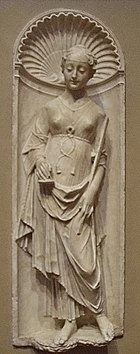Faith
[9] Religion has a long tradition, since the ancient world, of analyzing divine questions using common human experiences such as sensation, reason, science, and history that do not rely on revelation—called Natural theology.[11] Furthermore, the Proto-Indo-European root *were-o- adds another layer to the word's etymology, emphasizing the notions of truth and trustworthiness.[11] The term faith in English emerged in the mid-13th century, evolving from Anglo-French and Old French forms like feid and feit, ultimately tracing back to the Latin fidēs.[11] Referring to "religions" (plural), Pope Francis claims that "the majority of people living on our planet profess to be believers".[16] According to Teresa Morgan, faith was understood by early Christians within the cultural milieu of the period as a relationship that created a community based on trust, instead of a set of mental beliefs or feelings of the heart.Willingness to undergo martyrdom indicates a proxy for depth of faith but does not provide an everyday measurement for the average contemporary Christian.[24] Other Christian strands may rely on personal self-evaluation to measure the intensity of an individual's faith, with associated difficulties in calibrating to any scale.[clarification needed] Various tribunals of the Inquisition, however, concerned themselves with precisely evaluating the orthodoxy of the faith of those it examined – to acquit or to punish in varying degrees.[32] American biblical scholar Archibald Thomas Robertson (1863–1934) stated that the Greek word pistis used for "faith" in the New Testament (over two hundred forty times), and rendered "assurance" in Acts 17:31, is "an old verb meaning 'to furnish', used regularly by Demosthenes for bringing forward evidence."[33] Tom Price (Oxford Centre for Christian Apologetics) affirms that when the New Testament talks about faith positively it only uses words derived from the Greek root [pistis] which means "to be persuaded".[clarification needed] While Plantinga upholds that faith may be the result of evidence testifying to the reliability of the source (of the truth claims), yet he sees having faith as being the result of hearing the truth of the gospel with the internal persuasion by the Holy Spirit moving and enabling him to believe.[51] In early Buddhism, personal verification was valued highest in attaining the truth, and sacred scriptures, reason, or faith in a teacher were considered less valuable sources of authority.[56] With the arising of the cult of the Lotus Sūtra, faith gained a central role in Buddhist practice,[57] which was further amplified with the development of devotion to the Amitabha Buddha in Pure Land Buddhism.[58][59]: 123 In the Japanese form of Pure Land Buddhism, under the teachers Hōnen and Shinran, only entrusting faith toward the Amitabha Buddha was believed to be a fruitful form of practice, as the practice of celibacy, morality, and other Buddhist disciplines were dismissed as no longer effective in this day and age, or as contradicting the virtue of faith.However, from the nineteenth century onward, Buddhist modernism in countries like Sri Lanka and Japan, and also in the West, has downplayed and criticized the role of faith in Buddhism.[63] Bhakti (Sanskrit: भक्ति) literally means "attachment, participation, fondness for, homage, faith, love, devotion, worship, purity".[65] In ancient texts such as the Shvetashvatara Upanishad, the term simply means participation, devotion, and love for any endeavor, while in the Bhagavad Gita, it connotes one of the possible paths of spirituality and towards moksha, as in bhakti marga.[66] Ahimsa, also referred to as nonviolence, is a fundamental tenet of Hinduism that advocates harmonious and peaceful co-existence and evolutionary growth in grace and wisdom for all humankind unconditionally.[relevant?]Om is considered to have a profound effect on the body and mind of the one who chants and also creates a calmness, serenity, healing, strength of its own to prevail within and also in the surrounding environment.[relevant?]The articles include kēs (uncut hair), kaṅghā (small wooden comb), kaṛā (circular steel or iron bracelet), kirpān (sword/dagger), and kacchera (special undergarment).Baptised Sikhs are bound to wear those five articles of faith, at all times, to save them from bad company and keep them close to God.[82] Faith involves more than outward obedience to this authority, but also must be based on a deep personal understanding of religious teachings.On the other hand, some beliefs may not make empirical claims and instead focus on non-empirical issues such as ethics, morality, and spiritual practices.In these cases, it may be necessary to evaluate the validity of these beliefs based on their internal coherence and logical consistency, rather than empirical testing.Fideism is not a synonym for religious belief but describes a particular philosophical proposition concerning the relationship between faith's appropriate jurisdiction at arriving at truths, contrasted against reason.[95] Professor of Mathematics and philosopher of science at University of Oxford John Lennox justifies his religious belief in Jesus's resurrection and miracles by believing God's capability of breaking the commonly recognized law of nature.They also argue that it can lead to a kind of epistemic relativism, in which all religious beliefs are considered equally valid and justified, regardless of their content or coherence.Despite these criticisms, reformed epistemology has been influential in the contemporary philosophy of religion and continues to be an active area of debate and discussion.Christianity finds sickness necessary, just as the Greek spirit had need of a superabundance of health—the actual ulterior purpose of the whole system of salvation of the church is to make people ill. And the church itself—doesn't it set up a Catholic lunatic asylum as the ultimate ideal?—The whole earth as a madhouse?—The sort of religious man that the church wants is a typical décadent; the moment at which a religious crisis dominates a people is always marked by epidemics of nervous disorder; the "inner world" of the religious man is so much like the "inner world" of the overstrung and exhausted that it is difficult to distinguish between them; the "highest" states of mind, held up before mankind by Christianity as of supreme worth, are actually epileptoid in form—the church has granted the name of holy only to lunatics or to gigantic frauds in majorem dei honorem....Gustave Le Bon emphasizes the irrational nature of faith and suggests that it is often based on emotions rather than reason.In this sense, Le Bon views faith as a tool that can be wielded by those in power to shape the beliefs and behaviors of the masses.



Trust (social science)Faith (disambiguation)Mino da FiesolepersonreligionbeliefMerriam-Webster's Dictionarywarrantevidenceskeptical of religionThomas AquinasNatural theologyProto-Indo-EuropeanconfidencepersuasionAnglo-FrenchOld FrenchPope Francisour planetIdolatryJean-Baptiste ThéodonFaith in ChristianityAristotelianTeresa MorganfideismbelievermartyrdomCalvinistInquisitionreligiosityatheismRichard DawkinsAlister McGrathW. H. Griffith ThomasArchibald Thomas RobertsonDemosthenesJohn LennoxMorelanddoubting ThomasevidentialismepistemologicalfoundationalismdeontologismAlvin PlantingaHoly SpiritCatechism of the Catholic ChurchApostles' CreedtheologyPope John Paul IIJesus ChristMethodismjustificationNew BirthEmmanuel Associationconservative holiness movementArticles of Faiththe Church of Jesus Christ of Latter-day SaintsJoseph SmithLectures on FaithFaith in BuddhismBuddhasbodhisattvasearly BuddhismThree JewelsGautama BuddhaDhammamonastic communitySanghadeitiesupāsaka or upāsikawisdomenlightenmentNirvanaMahāyāna BuddhismBuddha NaturePure LandsLotus SūtraAmitabha BuddhaPure Land BuddhismHōnenShinranentrusting faithBuddhist modernismDalit Buddhist MovementrefugeBhaktiFaith in HinduismSanskritHinduismShvetashvatara UpanishadBhagavad GitamokshaAhimsanonviolenceIman (Islam)ArabicParadiseMuhammadHadith of GabrielJewish principles of faithApikorusChristianityknowledgeChristian faithAvodah Zarahidol worshipTalmudTanakhOrthodox JewsMaimonidesAbrahamSikhismFive KskaṅghākaṛākirpānkaccheraBaháʼí FaithManifestations of GodSecular religionsola fideEpistemologyphilosophical positionepistemological theoryreasontruths